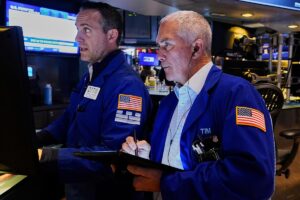Understanding Tariff Trends and Their Impact on Investment Strategies
Investors initially expressed optimism over President Trump’s recent tariff reductions and agreements with trading partners like China and the UK. However, a deeper dive reveals that despite these negotiations, the effective tariff rates remain elevated, which raises significant concerns for market stability and consumer prices.
According to Solita Marcelli, the Chief Investment Officer for Americas at UBS Global Wealth Management, the current effective tariff rate in the U.S. sits around 15%. This is a stark contrast to the 2.5% rate observed in January, illustrating a dramatic increase that’s six times higher. While the rollback of certain tariffs during the recently announced 90-day pause offers some relief, it’s essential to scrutinize whether these reductions can be sustained.
Marcelli cautions that the Trump administration’s openness to maintaining the 10% baseline tariff may hinder economic growth and lead to elevated prices for consumers. As an investor, it’s crucial to understand the potential ripple effects of these tariffs on various sectors, particularly retail.
Walmart’s CEO, Doug McMillon, emphasized the challenges retailers face in absorbing the pressures from tariffs. He stated, "We will do our best to keep our prices as low as possible, but given the magnitude of the tariffs, we aren’t able to absorb all the pressure due to narrow retail margins." This sentiment underscores a critical point: even modest tariff levels can trigger price hikes, complicating the financial landscape for both consumers and investors alike.
Market Volatility: An Investor’s Concern
The implications of ongoing tariffs extend beyond consumer prices into the stock market. Marcelli warns that while there is hope for a series of trade agreements to stabilize tariff levels, the uncertainty surrounding these negotiations could lead to increased market volatility. Investors should prepare for potential fluctuations as policies evolve and trade debates continue.
At Extreme Investor Network, we believe that informed investing requires not just an awareness of current events but a strategic assessment of how these events could impact various sectors. Understanding the nuances of tariff implications can empower investors to make more educated decisions about their portfolios.
Conclusion: A Strategic Approach
As we navigate these turbulent times, it’s vital for investors to stay ahead of market trends influenced by tariff policies. Keeping an eye on legislative developments and corporate responses will be essential for crafting robust investment strategies. By understanding both the macroeconomic effects and the micro-level responses from sectors like retail, you can better position your portfolio for the uncertainties ahead.
Stay tuned to Extreme Investor Network for deeper insights and analyses that can guide you through the complexities of the finance landscape, helping you to not just react, but to capitalize on the evolving market dynamics.

